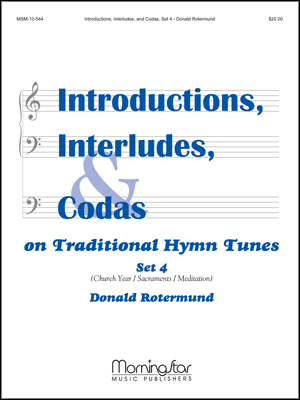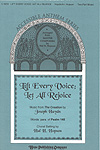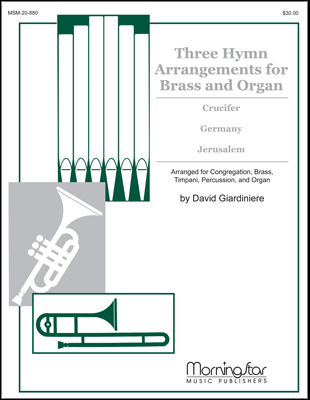- |
User Links
For a New-Year's Day

Eternal source of every joy
Author: Philip DoddridgePublished in 373 hymnals
Printable scores: PDF, MusicXMLAudio files: MIDI, Recording
Representative Text
1 Eternal Source of every joy,
Well may Thy praise our lips employ,
While in Thy temple we appear,
Whose goodness crowns the circling year.
2 Seasons, and months, and weeks, and days,
Demand successive songs of praise;
Still be the cheerful homage paid
With opening light and evening shade.
3 Here in Thy house shall incense rise,
And circling Sabbaths bless our eyes.
Still will we make Thy mercies known
Around Thy board, and round our own.
4 O may our more harmonious tongue
In worlds unknown pursue the song.
And in those brighter courts adore,
Where days and years revolve no more!
AMEN.
Source: The A.M.E. Zion Hymnal: official hymnal of the African Methodist Episcopal Zion Church #83
Author: Philip Doddridge
 Philip Doddridge (b. London, England, 1702; d. Lisbon, Portugal, 1751) belonged to the Non-conformist Church (not associated with the Church of England). Its members were frequently the focus of discrimination. Offered an education by a rich patron to prepare him for ordination in the Church of England, Doddridge chose instead to remain in the Non-conformist Church. For twenty years he pastored a poor parish in Northampton, where he opened an academy for training Non-conformist ministers and taught most of the subjects himself. Doddridge suffered from tuberculosis, and when Lady Huntington, one of his patrons, offered to finance a trip to Lisbon for his health, he is reputed to have said, "I can as well go to heaven from Lisbon as from Nort… Go to person page >
Philip Doddridge (b. London, England, 1702; d. Lisbon, Portugal, 1751) belonged to the Non-conformist Church (not associated with the Church of England). Its members were frequently the focus of discrimination. Offered an education by a rich patron to prepare him for ordination in the Church of England, Doddridge chose instead to remain in the Non-conformist Church. For twenty years he pastored a poor parish in Northampton, where he opened an academy for training Non-conformist ministers and taught most of the subjects himself. Doddridge suffered from tuberculosis, and when Lady Huntington, one of his patrons, offered to finance a trip to Lisbon for his health, he is reputed to have said, "I can as well go to heaven from Lisbon as from Nort… Go to person page >Text Information
| First Line: | Eternal source of every joy |
| Title: | For a New-Year's Day |
| Author: | Philip Doddridge |
| Meter: | 8.8.8.8 |
| Language: | English |
| Copyright: | Public Domain |
Notes
Eternal Source of every joy. P. Doddridge. [New Year.] Dated in the D. MSS. Jan. 1, 1736, and first published by Job Orton in his posthumous edition of Doddridge's Hymns, &c, 1755, No. 43, in 7 stanzas of 4 lines, and in J. D. Humphreys's edition of the same, 1839, No. 55. In the D. MSS. the title is, "God crowning the Year with His goodness"; and in the Hymns, "The Year crowned with the divine goodness." It is usually given in an abbreviated form, the number of stanzas varying in the various hymn-books. Its use in Great Britain is much less extensive than in America. The text usually adopted is from the 1755 book, as in Lyra Britannica, 1867, p. 193; that, however, in the Methodist Sunday School Hymn Book is from the Brooke manuscript of Doddridge's Hymns.
--John Julian, Dictionary of Hymnology (1907)
Tune
WAREHAM (Knapp)William Knapp (b. Wareham, Dorsetshire, England, 1698; d. Poole, Dorsetshire, 1768) composed WAREHAM, so named for his birthplace. A glover by trade, Knapp served as the parish clerk at St. James's Church in Poole (1729-1768) and was organist in both Wareham and Poole. Known in his time as the "coun…
GERMANY (Gardiner)
CREATION (Haydn)
The tune CREATION is taken from the chorus “The Heavens Are Telling” from the well known oratorio The Creation (1798) by Franz Joseph Haydn (b. Rohrau, Austria, 1732; d. Vienna, Austria, 1809). Haydn's life was relatively uneventful, but his artistic legacy was truly astounding. He began his mus…
Timeline
Arrangements
Media
Methodist Tune Book: a collection of tunes adapted to the Methodist Hymn book #9
- MusicXML (XML)


 My Starred Hymns
My Starred Hymns





